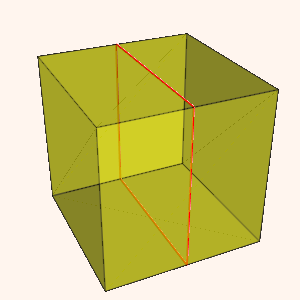DataSetSurface
Repository source: DataSetSurface
Other languages
See (Python), (PythonicAPI)
Question
If you have a question about this example, please use the VTK Discourse Forum
Code¶
DataSetSurface.cxx
#include <vtkActor.h>
#include <vtkCamera.h>
#include <vtkCellArray.h>
#include <vtkCutter.h>
#include <vtkDataSetMapper.h>
#include <vtkDataSetSurfaceFilter.h>
#include <vtkHexahedron.h>
#include <vtkNamedColors.h>
#include <vtkNew.h>
#include <vtkPlane.h>
#include <vtkPoints.h>
#include <vtkPolyDataMapper.h>
#include <vtkProperty.h>
#include <vtkRenderWindow.h>
#include <vtkRenderWindowInteractor.h>
#include <vtkRenderer.h>
#include <vtkUnstructuredGrid.h>
#include <array>
#include <cstdlib>
int main(int, char*[])
{
vtkNew<vtkNamedColors> colors;
// Setup the coordinates of eight points
// (the two faces must be in counter clockwise order as viewed from the
// outside)
std::array<std::array<double, 3>, 8> pointCoords{{{{0.0, 0.0, 0.0}},
{{1.0, 0.0, 0.0}},
{{1.0, 1.0, 0.0}},
{{0.0, 1.0, 0.0}},
{{0.0, 0.0, 1.0}},
{{1.0, 0.0, 1.0}},
{{1.0, 1.0, 1.0}},
{{0.0, 1.0, 1.0}}}};
// Create the points and a hexahedron from the points.
vtkNew<vtkPoints> points;
vtkNew<vtkHexahedron> hexa;
for (auto i = 0; i < pointCoords.size(); ++i)
{
points->InsertNextPoint(pointCoords[i].data());
hexa->GetPointIds()->SetId(i, i);
}
// Add the hexahedron to a cell array.
vtkNew<vtkCellArray> hexs;
hexs->InsertNextCell(hexa);
// Add the points and hexahedron to an unstructured grid.
vtkNew<vtkUnstructuredGrid> uGrid;
uGrid->SetPoints(points);
uGrid->InsertNextCell(hexa->GetCellType(), hexa->GetPointIds());
// Extract the outer (polygonal) surface.
vtkNew<vtkDataSetSurfaceFilter> surface;
surface->SetInputData(uGrid);
surface->Update();
vtkNew<vtkDataSetMapper> aBeamMapper;
aBeamMapper->SetInputConnection(surface->GetOutputPort());
vtkNew<vtkActor> aBeamActor;
aBeamActor->SetMapper(aBeamMapper);
aBeamActor->AddPosition(0, 0, 0);
aBeamActor->GetProperty()->SetColor(colors->GetColor3d("Yellow").GetData());
aBeamActor->GetProperty()->SetOpacity(0.60);
aBeamActor->GetProperty()->EdgeVisibilityOn();
aBeamActor->GetProperty()->SetEdgeColor(
colors->GetColor3d("Black").GetData());
aBeamActor->GetProperty()->SetLineWidth(1.5);
// Create a plane to cut, here it cuts in the XZ direction
// (xz normal=(1,0,0); XY =(0,0,1), YZ =(0,1,0)
vtkNew<vtkPlane> plane;
plane->SetOrigin(0.5, 0, 0);
plane->SetNormal(1, 0, 0);
// Create cutter
vtkNew<vtkCutter> cutter;
cutter->SetCutFunction(plane);
cutter->SetInputData(aBeamActor->GetMapper()->GetInput());
cutter->Update();
vtkNew<vtkPolyDataMapper> cutterMapper;
cutterMapper->SetInputConnection(cutter->GetOutputPort());
// Create plane actor
vtkNew<vtkActor> planeActor;
planeActor->GetProperty()->SetColor(colors->GetColor3d("Red").GetData());
planeActor->GetProperty()->SetLineWidth(2);
planeActor->SetMapper(cutterMapper);
// Create a renderer, render window, and interactor
vtkNew<vtkRenderer> renderer;
vtkNew<vtkRenderWindow> renderWindow;
renderWindow->SetWindowName("DatasetSurface");
renderWindow->AddRenderer(renderer);
vtkNew<vtkRenderWindowInteractor> renderWindowInteractor;
renderWindowInteractor->SetRenderWindow(renderWindow);
// Add the actors to the scene
renderer->AddActor(aBeamActor);
renderer->AddActor(planeActor);
renderer->SetBackground(colors->GetColor3d("Seashell").GetData());
renderer->ResetCamera();
renderer->GetActiveCamera()->Azimuth(-25);
renderer->GetActiveCamera()->Elevation(30);
// Render and interact
renderWindow->Render();
renderWindowInteractor->Start();
return EXIT_SUCCESS;
}
CMakeLists.txt¶
cmake_minimum_required(VERSION 3.12 FATAL_ERROR)
project(DataSetSurface)
find_package(VTK COMPONENTS
CommonColor
CommonCore
CommonDataModel
FiltersCore
FiltersGeometry
InteractionStyle
RenderingContextOpenGL2
RenderingCore
RenderingFreeType
RenderingGL2PSOpenGL2
RenderingOpenGL2
)
if (NOT VTK_FOUND)
message(FATAL_ERROR "DataSetSurface: Unable to find the VTK build folder.")
endif()
# Prevent a "command line is too long" failure in Windows.
set(CMAKE_NINJA_FORCE_RESPONSE_FILE "ON" CACHE BOOL "Force Ninja to use response files.")
add_executable(DataSetSurface MACOSX_BUNDLE DataSetSurface.cxx )
target_link_libraries(DataSetSurface PRIVATE ${VTK_LIBRARIES}
)
# vtk_module_autoinit is needed
vtk_module_autoinit(
TARGETS DataSetSurface
MODULES ${VTK_LIBRARIES}
)
Download and Build DataSetSurface¶
Click here to download DataSetSurface and its CMakeLists.txt file. Once the tarball DataSetSurface.tar has been downloaded and extracted,
cd DataSetSurface/build
If VTK is installed:
cmake ..
If VTK is not installed but compiled on your system, you will need to specify the path to your VTK build:
cmake -DVTK_DIR:PATH=/home/me/vtk_build ..
Build the project:
make
and run it:
./DataSetSurface
WINDOWS USERS
Be sure to add the VTK bin directory to your path. This will resolve the VTK dll's at run time.
